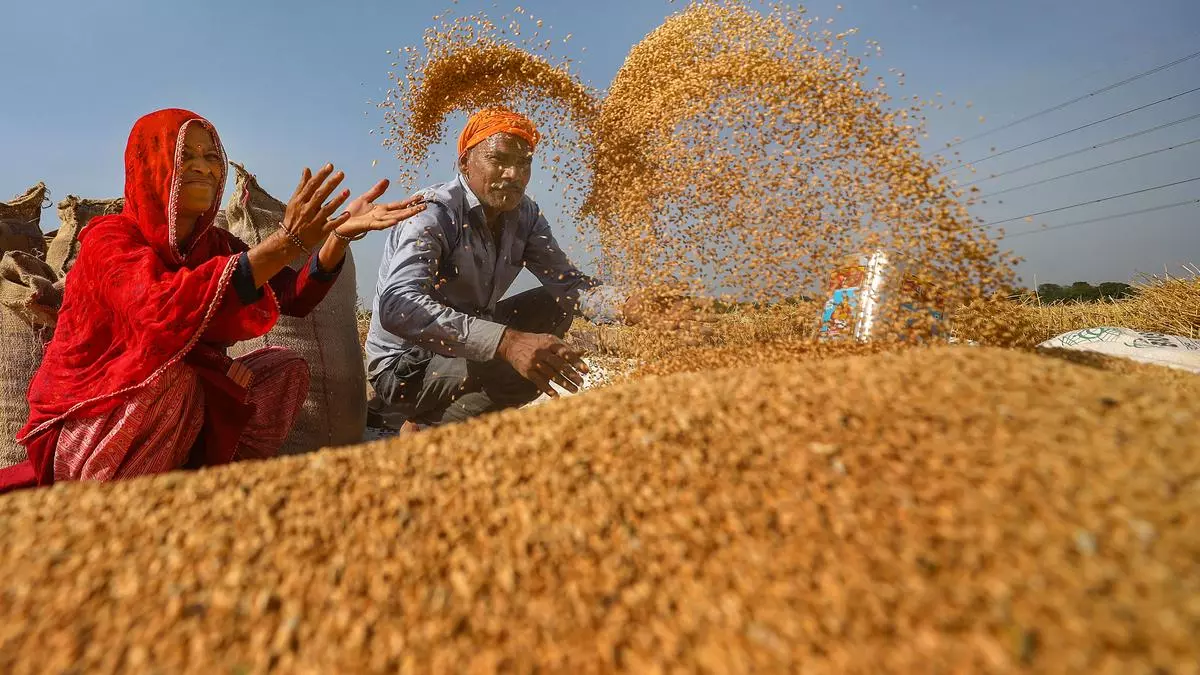Bangladesh : Drastic fall in wheat production drives up imports

Bangladesh faces a significant decline in wheat production, leading to increased import dependency. Over 25 years, wheat production fell from 19.08 lakh tonnes to 11.72 lakh tonnes in FY24, with local output meeting only 15% of demand. Farmers prefer maize and vegetables for higher profits. Wheat imports surged 71% in FY24, costing around $2,032 million, driven by lower global prices and domestic demand. Climate change and wheat blast disease further complicate local production.
A sharp decline in wheat production in the country over the last 25 years has augmented the country’s import dependency to meet the local demand for the staple.
Farmers previously growing wheat have been shifting their investments to produce other crops like maize, mustard and vegetables as they find them economically more viable, said sector insiders.
As a result, the country has to spend more foreign currency to import wheat to meet the rising demand.
The Bangladesh Bureau of Statistics (BBS) data shows that both the wheat field area and production have been declining in the country over the last two and half decades.
The production of wheat fell to 11.72 lakh tonnes on around 3.11 lakh hectares of land in FY24, from 19.08 lakh tonnes on 8.8 lakh hectares of land in fiscal year 1998-1999, according to the BBS data.
Wheat is the second most significant staple food after rice in the country. Its local production currently accounts for 15% of the total demand.
The lack of improved varieties has led to a gradual decline in both the cultivation area and production of wheat over time, according to the Grain and Feed Annual Report of the US Department of Agriculture (USDA).
Besides, wheat blast disease – which reduces its yields significantly – has severely diminished its production.
Due to these issues, farmers make higher profits by cultivating fruits and vegetables during the Robi season compared to that they make by growing wheat.
Wheat import rises
Wheat import to the country has increased manifold over the years due to its higher demand from local food processors, lower international prices and declining domestic production.
Dr Jahangir Alam Khan, an agro-economist and researcher, told the Daily Sun that due to lower international prices, local businessmen imported a higher amount of wheat last year to meet the domestic demand.
The country spent around $2,032 million for importing wheat in FY24, while it spent about $2,027 million for importing it in FY23, according to the Bangladesh Bank.
In FY24, the country imported 66.29 lakh tonnes of wheat which was record high. In the previous fiscal it imported 38.76 lakh tonnes, according to the Ministry of Food.
In FY24, Bangladesh experienced a notable increase in wheat imports, a significant 71% rise from the previous year, according to a report from the ministry.
Experts said despite the significant rise in wheat import, import cost increased by only around $5 million in FY24 compared to the previous year, as wheat prices in the global market in FY23 were almost double that in the last fiscal.
Wheat imports by the government increased by 15.4% and by the private sector importers climbed sharply by 82.9% in FY24, according to the report.
Tajul Islam Patwary, director general of the Department of Agriculture Extension (DAE), told the Daily Sun that farmers are more interested in the cultivation of maize, mustard and vegetables than wheat since they are getting higher produce from those crops.
“Wheat production has fallen after the blast disease spread in the country. Farmers get only around 3 tonnes of wheat on a hectare of land while they get 10-13 tonnes of maize in the same size of land. Farmers also get more by-products from maize,” he said.
The wheat blast hit the country in 2015 for the first time. The outbreak discouraged the farmers in the country’s south-western regions to continue wheat farming, according to the agricultural economists.
Due to the high international price, supply chain disruptions, and depreciation of the local currency against the US dollar, the costs of importing wheat escalated in FY23, resulting in higher prices for all types of wheat flour in the local market, according to the US Department of Agriculture (USDA).
Wheat prices decreased gradually from January 2023 to October 2023 due to lower international prices and better supply chain logistics. From November 2023, the price of wheat flour has risen slightly with higher costs of milling, local transportation, and inflation.
Climate change and changing weather patterns are also affecting wheat production negatively.
Wheat cultivation in Bangladesh begins during the period between November and mid-January. Wheat is harvested between February and April.
Wheat mainly grows in Rangpur, Rajshahi, Khulna, Kushtia, Chuadanga, Jhenaidah and some parts of Dhaka division on a large scale where the winter season lasts for a long time.
Food, seed, and industrial consumption of wheat
For FY25, the USDA forecasts a rise in food, seed, and industrial (FSI) wheat consumption to 7 million tonnes, 3% higher than the FY24 estimate, on higher imports and rebounding demand for aata and maida at the household level.
It maintains its FSI consumption estimate for FY24 at 6.8 million tonnes.
Wheat flour has diverse uses at the household level, as well as in restaurants, bakeries, and the food industry. Due to changing dietary patterns among city dwellers, there has been a reduction in rice consumption and an increase in the consumption of wheat flour-based “roti” (flatbread).
Additionally, with the growing middle-class, the demand for bakery products has increased. People often dine out at hotels and restaurants where a variety of wheat flour-based foods are served. The biscuit, noodle, and pasta making industry is also expanding, consuming significant amounts of wheat flour.
In addition to domestic consumption of these wheat-based products, Bangladesh is also exporting them.
In FY23, the total export value of wheat-based products from Bangladesh was $200 million. Common wheat-based products exported from Bangladesh include bread, pastry, cakes, sweet biscuits, roasted cereals, and pasta.
Source Link : https://www.daily-sun.com/post/767928















